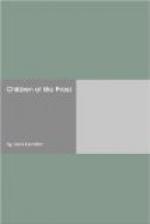Koogah lifted his grizzled head from his bone-carving and followed the path of her eyes. Except when wide yaws took it off its course, a bidarka was heading in for the beach. Its occupant was paddling with more strength than dexterity, and made his approach along the zigzag line of most resistance. Koogah’s head dropped to his work again, and on the ivory tusk between his knees he scratched the dorsal fin of a fish the like of which never swam in the sea.
“It is doubtless the man from the next village,” he said finally, “come to consult with me about the marking of things on bone. And the man is a clumsy man. He will never know how.”
“It is Nam-Bok,” old Bask-Wah-Wan repeated. “Should I not know my son?” she demanded shrilly. “I say, and I say again, it is Nam-Bok.”
“And so thou hast said these many summers,” one of the women chided softly. “Ever when the ice passed out of the sea hast thou sat and watched through the long day, saying at each chance canoe, ’This is Nam-Bok.’ Nam-Bok is dead, O Bask-Wah-Wan, and the dead do not come back. It cannot be that the dead come back.”
“Nam-Bok!” the old woman cried, so loud and clear that the whole village was startled and looked at her.
She struggled to her feet and tottered down the sand. She stumbled over a baby lying in the sun, and the mother hushed its crying and hurled harsh words after the old woman, who took no notice. The children ran down the beach in advance of her, and as the man in the bidarka drew closer, nearly capsizing with one of his ill-directed strokes, the women followed. Koogah dropped his walrus tusk and went also, leaning heavily upon his staff, and after him loitered the men in twos and threes.
The bidarka turned broadside and the ripple of surf threatened to swamp it, only a naked boy ran into the water and pulled the bow high up on the sand. The man stood up and sent a questing glance along the line of villagers. A rainbow sweater, dirty and the worse for wear, clung loosely to his broad shoulders, and a red cotton handkerchief was knotted in sailor fashion about his throat. A fisherman’s tam-o’-shanter on his close-clipped head, and dungaree trousers and heavy brogans, completed his outfit.
But he was none the less a striking personage to these simple fisherfolk of the great Yukon Delta, who, all their lives, had stared out on Bering Sea and in that time seen but two white men,—the census enumerator and a lost Jesuit priest. They were a poor people, with neither gold in the ground nor valuable furs in hand, so the whites had passed them afar. Also, the Yukon, through the thousands of years, had shoaled that portion of the sea with the detritus of Alaska till vessels grounded out of sight of land. So the sodden coast, with its long inside reaches and huge mud-land archipelagoes, was avoided by the ships of men, and the fisherfolk knew not that such things were.
Koogah, the Bone-Scratcher, retreated backward in sudden haste, tripping over his staff and falling to the ground. “Nam-Bok!” he cried, as he scrambled wildly for footing. “Nam-Bok, who was blown off to sea, come back!”




